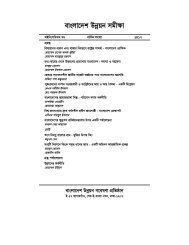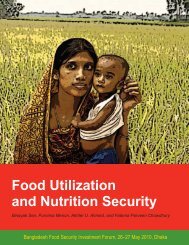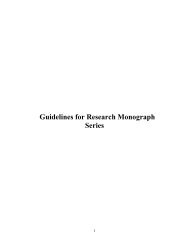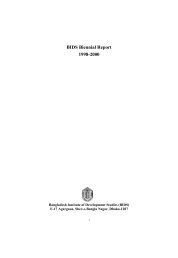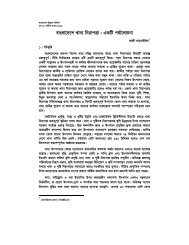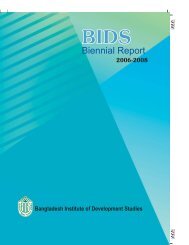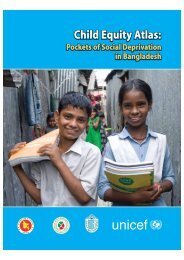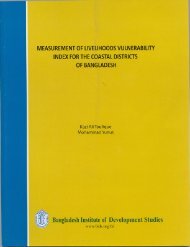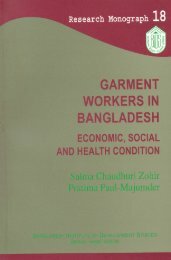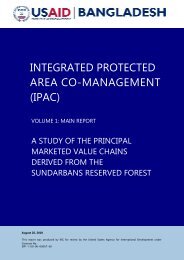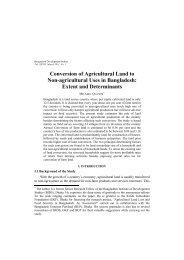2009-2010 - BIDS
2009-2010 - BIDS
2009-2010 - BIDS
You also want an ePaper? Increase the reach of your titles
YUMPU automatically turns print PDFs into web optimized ePapers that Google loves.
people of different walks of life who are interested<br />
in development issues of Bangladesh. The 26th<br />
and 27th issues of BUS were published in <strong>2009</strong> and<br />
<strong>2010</strong> respectively<br />
Edited Volumes<br />
Development<br />
Experience and<br />
Emerging Challenges:<br />
BANGLADESH<br />
Despite widespread pessimism,<br />
Bangladesh has<br />
achieved considerable<br />
success and performed<br />
well in several areas of<br />
development. The economy<br />
has also moved to a<br />
higher growth path over the last two decades.<br />
This has led many to believe that Bangladesh<br />
can realize its growth potential so as to join<br />
the ranks of middle income countries within a<br />
decade or so. The transition to the higher growth<br />
regime has, however, been accompanied by<br />
worsening income distribution over time. This<br />
obviously raises concern about the quality of<br />
growth in terms of rate of poverty reduction,<br />
degree of income inequality, and generation of<br />
productive employment. This volume, edited by<br />
Quazi Shahabuddin and Rushidan Islam Rahman,<br />
contains selected papers and proceedings of the<br />
panel discussion of an international conference<br />
on the theme, ‘Development Prospects of<br />
Bangladesh: Emerging Challenges’, organized<br />
by <strong>BIDS</strong> in December 2007 on the occasion of its<br />
Golden Jubilee Celebration. It is expected that<br />
the ideas and the engaging intellectual debate on<br />
development experience, emerging challenges,<br />
and policy options for development of Bangladesh<br />
presented in the volume will be useful to a wide<br />
audience, both academicians and development<br />
practitioners alike.<br />
A Ship Adrift: Governance and Development in<br />
Bangladesh<br />
In the development discourse, the failure of<br />
nations to grow economically and gain socially<br />
has been attributed in a large measure to the lack<br />
of ‘good’ governance. The issue remains elusive<br />
to many, when the ground reality sometimes<br />
contradicts the new conventional wisdom. Over<br />
the past one decade and a half, Bangladesh has<br />
enjoyed a fair pace of economic growth and made<br />
impressive gains in several key social indicators.<br />
Yet the country ranks poorly on many aspects of<br />
governance. This raises several questions: Does<br />
governance really matter in development Would<br />
Bangladesh’s performance have been better<br />
or qualitatively different with seemingly better<br />
governance Or, is governance in Bangladesh<br />
not as bad as these perception-based indicators<br />
seem to suggest An international workshop<br />
in Dhaka examined these and related issues in<br />
2006 to better explore and understand ways in<br />
which governance and development interact and<br />
interface with each other. This book, edited by<br />
Nurul Islam and M. Asaduzzaman, brings together<br />
selected papers from the workshop. It is expected<br />
that the book will initiate wide ranging debates<br />
to look at governance issues that arise in specific<br />
sectors as well as in the management of the<br />
economy as a whole.<br />
Special Publications<br />
Role of Experts in Policy Advice: Lessons of<br />
Experience<br />
In this volume, Professor Nurul Islam, one of<br />
the leading development economists who has<br />
successfully combined professional excellence<br />
with policy making at the<br />
highest level, examines<br />
the role of experts in policy<br />
advice in order to draw<br />
lessons from his valuable<br />
personal experience.<br />
Recognizing the highly<br />
complex nature of policy<br />
making in a modern<br />
state, he suggests that,<br />
apart from building up<br />
strong public institutions<br />
36<br />
<strong>BIDS</strong> Biennial Report <strong>2009</strong>-<strong>2010</strong>



